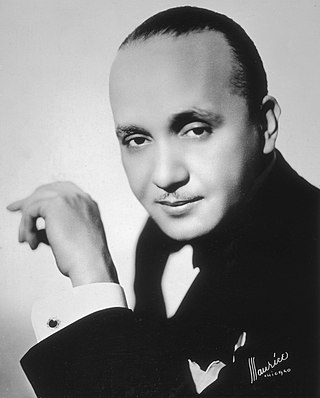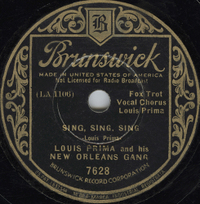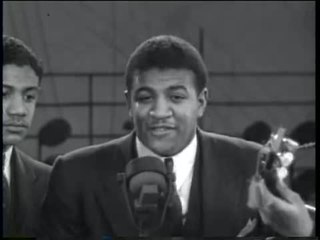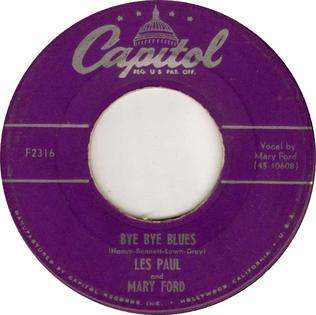Related Research Articles
When My Baby Smiles at Me is the name of a popular song with music by Bill Munro and words by Andrew B. Sterling and Ted Lewis, that was published by Harry Von Tilzer Music Publishing in 1920. It was interpolated into the Broadway show The Greenwich Village Follies (1919) and was the first big hit for clarinettist, vocalist and comedian Ted Lewis (1892–1971). Ted Lewis's jazz band recording in 1920 for Columbia Records, became his signature tune, and spent 18 weeks on the charts. Ted Lewis re-recorded it several times over the years and his 1938 version for Decca also charted briefly. The tune was also covered by other artists of the time.

David Roy Eldridge, nicknamed "Little Jazz", was an American jazz trumpeter. His sophisticated use of harmony, including the use of tritone substitutions, his virtuosic solos exhibiting a departure from the dominant style of jazz trumpet innovator Louis Armstrong, and his strong impact on Dizzy Gillespie mark him as one of the most influential musicians of the swing era and a precursor of bebop.

James Fletcher Hamilton Henderson was an American pianist, bandleader, arranger and composer, important in the development of big band jazz and swing music. He was one of the most prolific black musical arrangers and, along with Duke Ellington, is considered one of the most influential arrangers and bandleaders in jazz history. Henderson's influence was vast. He helped bridge the gap between the Dixieland and the swing eras. He was often known as "Smack" Henderson.

Coleman Randolph Hawkins, nicknamed "Hawk" and sometimes "Bean", was an American jazz tenor saxophonist. One of the first prominent jazz musicians on his instrument, as Joachim E. Berendt explained: "there were some tenor players before him, but the instrument was not an acknowledged jazz horn". Hawkins biographer John Chilton described the prevalent styles of tenor saxophone solos prior to Hawkins as "mooing" and "rubbery belches". Hawkins denied being first and noted his contemporaries Happy Caldwell, Stump Evans, and Prince Robinson, although he was the first to tailor his method of improvisation to the saxophone rather than imitate the techniques of the clarinet. Hawkins' virtuosic, arpeggiated approach to improvisation, with his characteristic rich, emotional, and vibrato-laden tonal style, was the main influence on a generation of tenor players that included Chu Berry, Charlie Barnet, Tex Beneke, Ben Webster, Vido Musso, Herschel Evans, Buddy Tate, and Don Byas, and through them the later tenormen, Arnett Cobb, Illinois Jacquet, Flip Phillips, Ike Quebec, Al Sears, Paul Gonsalves, and Lucky Thompson. While Hawkins became known with swing music during the big band era, he had a role in the development of bebop in the 1940s.
Leon Brown "Chu" Berry was an American jazz tenor saxophonist during the 1930s. He is perhaps best known for his time as a member of singer Cab Calloway's big band.

"Sing, Sing, Sing " is a 1936 song, with music and lyrics by Louis Prima, who first recorded it with the New Orleans Gang. Brunswick Records released it on February 28, 1936 on the 78 rpm record format, with "It's Been So Long" as the B-side. The song is strongly identified with the big band and swing eras. Several have performed the piece as an instrumental, including Fletcher Henderson and, most famously, Benny Goodman.
"I Want to Be Happy" is a song with music by Vincent Youmans and lyrics by Irving Caesar written for the 1925 musical No, No, Nanette.
"Moonglow", also known as "Moonglow and Love" is a 1933 popular song. The music was by Will Hudson and Irving Mills and the words were by Eddie DeLange.

"Somebody Loves Me" is a popular song, with music written by George Gershwin, and lyrics by Ballard MacDonald and Buddy DeSylva. The song was published in 1924 and featured in George White's Scandals of 1924.

"Dinah" is a popular song published in 1925 and introduced by Ethel Waters at the Plantation Club on Broadway. It was integrated into the show Kid Boots. The music was written by Harry Akst and the lyrics by Sam M. Lewis and Joe Young. Hit versions in 1926 were by Ethel Waters, The Revelers, Cliff Edwards, and Fletcher Henderson.

Antti Juhani Sarpila is a Finnish jazz clarinetist.
"Darn That Dream" is a popular song composed by Jimmy Van Heusen with lyrics by Eddie DeLange. It was published in 1939 and ranked No. 1 in 1940 when a recording was released by Benny Goodman in an arrangement by Eddie Sauter with Mildred Bailey singing the vocal. Other popular recordings in 1940 were by Blue Barron & His Orchestra and by Tommy Dorsey.

"Bye Bye Blues" is an American popular and jazz standard written by Fred Hamm, Dave Bennett, Bert Lown, and Chauncey Gray and published in 1925.

Lady Day: The Complete Billie Holiday on Columbia 1933–1944 is a 10-CD box set compiling the complete known studio master recordings, plus alternate takes, of Billie Holiday during the time period indicated, released in 2001 on Columbia/Legacy, CXK 85470. Designed like an album of 78s, the medium in which these recordings initially appeared, the 10.5" × 12" box includes 230 tracks, a 116-page booklet with extensive photos, a song list, discography, essays by Michael Brooks, Gary Giddins, and Farah Jasmine Griffin, and an insert of appreciations for Holiday from a diversity of figures including Tony Bennett, Elvis Costello, Marianne Faithfull, B.B. King, Abbey Lincoln, Jill Scott, and Lucinda Williams. At the 44th Grammy Awards on February 27, 2002, the box set won the Grammy Award for Best Historical Album of the previous year.
Joel Edward Helleny was an American jazz trombonist.
"Baby Won't You Please Come Home" is a blues song written by Charles Warfield and Clarence Williams in 1919. The song's authorship is disputed; Warfield claims that he was the sole composer of the song.

Heckler's Hop is a 1995 compilation album collecting work from the mid- to late-1930s by jazz trumpet-player Roy Eldridge. Released by Hep Records, the album is listed as one of the "Core Collection" albums in The Penguin Guide to Jazz and, by Allmusic, "essential for fans of Jazz trumpet."
Christopher Columbus is an American jazz song composed by Chu Berry with lyrics by Andy Razaf. Pianist Fats Waller turned the tune into a 1936 novelty hit which was subsequently recorded by numerous other artists and became a jazz standard. Jimmy Mundy wrote the lead into a medley with "Sing, Sing, Sing" for Benny Goodman.

A Study in Frustration: The Fletcher Henderson Story is a box set compilation surveying studio recordings of the Fletcher Henderson Orchestra from 1923 to 1938, released in 1961 on Columbia Records, CXK 85470. It initially appeared as a four-album set produced by Frank Driggs and assembled by John Hammond, both of whom also wrote the liner notes. The set was part of a Thesaurus of Classic Jazz series on Columbia which included King of the Delta Blues Singers also worked on by Hammond and Driggs and released in 1961, the first album reissue of songs by blues legend Robert Johnson.
"This Year's Kisses" is a popular song written in 1936 by Irving Berlin for the musical film On the Avenue (1937) and introduced by Alice Faye. Popular recordings in 1937 were by Benny Goodman, Hal Kemp, Shep Fields and by Teddy Wilson with Billie Holiday.
References
- 1 2 Vaché, Warren (2000). The Unsung Songwriters (1st ed.). Lanham, Md.: Scarecrow Press. pp. 33–4. ISBN 978-0810835702.
- ↑ Brunvand, Jan Harold (2002). Encyclopedia of Urban Legends . New York: W. W. Norton & Company. p. 275. ISBN 978-0393323580.
- ↑ Pareles, Jon (30 April 1998). Helen Ward, 82, Who Sang Hits With Goodman's Band in the 30s, The New York Times
- ↑ Goldsby, John (2002). The Jazz Bass Book - Technique and Tradition. San Francisco: Backbeat Books. p. 54. ISBN 978-0879307165.
- ↑ Chilton, John (2002). Roy Eldridge, Little Jazz Giant. London: Continuum International Publishing Group. p. 320. ISBN 978-0826456922.
- ↑ discography of Melotone Records 1936 releases
- ↑ Mosaic Records discography of Chu Berry
- ↑ Description of "Lars Erstrand and Four Brothers" album Archived 2011-02-24 at the Wayback Machine
- ↑ The Keith Ingham New York 9, Vol. 1 at Allmusic
- ↑ Julie Is Her Name, Volume II on Allmusic.com
- ↑ Manhattan Moods: Outstanding Live Recordings at Allmusic
- ↑ Brunswick Records 7500-7999 discography